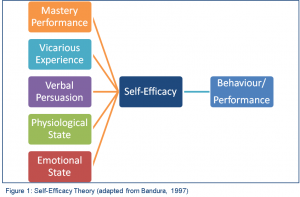Self-Efficacy and Gender
I was reading over Erin Zhu’s blog post on self-efficacy, the motivational theory that states an individual’s behaviour is influenced by their beliefs in their own abilities and it reminded me of a concept I had heard earlier in the day.

Picture From: http://www.benjanefitness.com/news-1/supportingbehaviourchange
In her blog post Erin asks the question ‘What is wrong with being confident?’ and it reminded me of when I was watching Sheryl Standberg’s TedTalk. Sheryl said that as a woman in a high level position, she has realized that there is a negative correlation between the success of women and their likability by others. Sheryl is saying that the women in these high ranking positions have a high self-efficacy rating, but their success from their confidence in their beliefs comes with negative judgment from others. She also compares this to the positive correlations of men’s success and the likability as perceived by others.
So, I believe the real question we should be asking is, ‘What is wrong with women being confident?’ and ‘How can this negative correlation affect women’s self-efficacy moving forward?’. By asking these questions we can attempt to change this assumption society makes, that successful confident women aren’t likeable. By creating a discussion, you can bring attention to those who unknowingly compare these high-ranking women negatively to men holding the same ranking.
Word Count: 218
Work Cited
Sandberg, S. (2010, December 21). Sheryl Sandberg: Why we have too few women leaders [Video file]. Retrieved from http://www.ted.com/talks/sheryl_sandberg_why_we_have_too_few_women_leaders.html